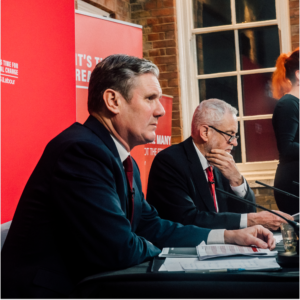The upcoming UK general election is expected in the second half of 2024. Recent figures suggest that Labour party leader Keir Starmer is set to achieve a 1997-style landslide majority, according to YouGov.

December 6, 2019. Keir Starmer (L) discussing the Labour Party's Brexit policies with Jeremy Corbyn.
February 9, 2024
With £28bn ‘green investment’ pledge gone, what Labour’s government will mean for the UK economy
Learn more:
By Jefferson He
In preparation for the election, Labour has released its missions for Britain which included
promises to promote economic stability, ensure strong national defence, and secure tighter border control.
The party has also decided to abandon its promise to spend £28 billion a year on green investment.
Labour’s “Five Point Plan for Growth” aims to promote economic prosperity in all parts of the country if elected – Starmer has vowed to make the UK the fastest-growing major economy by the end of a first Labour term in government.
Harbingers’ has put together this list to outline each pledge and analyse it’s economic impact if implemented.
1. Economic stability
The party has announced that it would give more powers to the Office for Budget Responsibility (OBR), a public body that provides independent economic forecasts and analysis of UK public finances, if elected.
The Shadow Chancellor, Rachel Reeves, said “these changes will be put to parliament as a new charter of Budget responsibility. This will introduce a new fiscal lock on Britain’s economic institutions to strengthen our financial stability and stability.”
As stated, the aim is to ensure stability by making the government more accountable in its fiscal policies (i.e. any use of government spending and/or taxation to influence the economy).
This was sparked as a result of the Lizz Truss / Kwasi Kwarteng mini budget in September 2022 bypassing the OBR which severely impacted the economy. It resulted in an all-time-low value of the pound against the US dollar, higher long-term government debt, and £45 billion in unfunded tax cuts.
Labour has blamed the mini-budget for “crashing the economy” and leaving “working people worse off.”It argues that the additional power given to the OBR will prevent any future policies seeking short-run economic growth without regards to the economy in the longer term (i.e. inflation and debt).
“The economic damage done by the Conservatives’ mini-budget was nothing short of disastrous, and Britain is still paying the price, with higher mortgages, higher energy bills and higher prices in the shops,” Reeved said in quotes in The Guardian in September 2023.
Such comments are more than likely not going unheard by the UK population, amid people struggling with higher bills and mortgage rates.
2. Reforming planning laws
The party intends to get “Britain building again” by initiating plans to reform planning laws in order to kickstart 1.5 million new homes, transport, clean energy, and industries across the whole country.
The desired outcome would give way to cheaper bills through a higher supply of energy, and modern infrastructure that would have positive effects on households – it would boost the economic welfare of the general public through higher consumption of goods and services.
This in turn would foster more economic growth and improve their material standards of living.
The mission follows the party’s new “pro-building” agenda in which Starmer promised a “blitz of planning reform to quickly boost housebuilding.”
Read more:
‘There are a number of changes that could be relatively quick to enact and would help to speed up England’s planning process.’
But Jamie Lockerbie, a partner at Pinset Masons specialising in town and country planning law, believes that there are a number of better alternatives in ensuring the faster development of housing.
This includes making housing a nationally significant infrastructure project, setting mandatory house building targets across the country, and abandoning the infrastructure levy by reforming the Community Infrastructure Levy (CIL).
The Conservatives have attempted to mitigate the falling homeownership in England by offering financial help for new buyers. But the impact of those schemes have been limited due to low supply.
The issue is further amplified by the Housing Secretary, Michael Gove, dropping mandatory building targets to voluntary ones as a result of strong Conservative backbench resistance towards local planning in their constituencies.
“There is not one single housing crisis,” instead the UK is experiencing “many localised housing crises” caused by a disconnected planning system between local supply and demand, think tank Centre for Cities reported.
3. Growth of businesses
Labour has plans to create a National Wealth Fund (NWF) to “unlock billions of pounds of private investment” as well as “crowding in three times the amount of public investment.” The fund will invest in new industries and act as a mechanism for a share of the wealth for the people and taxpayers will get a return on those investments.
The investments will predominantly focus on energy and climate.
Shevaun Haviland, director general at the British Chambers of Commerce (BCC), said: “We believe that Net Zero, and developing technology projects in this space, should absolutely be the focus for investment by the National Wealth Fund. Opportunity is ripe across green industries, and now is the time to place the UK economy and businesses at the vanguard of this new wave, which has massive potential for growth.”
Examples of successful NWF’s include Australia’s Future Fund in which it was established in 2006 to strengthen the government’s long-term financial position where it has succeeded in passing its benchmark of 6.9% per annum over the last decade – the fund has returned 8.4% per annum.
Rachel Reeves, Shadow Chancellor, is particularly bullish in Labour’s commitment to investing in growing industries such as Net Zero and developing technology projects through the NWF.
Ed Miliband, former Labour Leader and current Climate Change Secretary, concluded that the National Wealth Fund will put the UK at the forefront of “industries such as hydrogen, electric vehicles, green steel and offshore wind.”
4. Increasing skill occupation
The latest figures by the OBR indicate a somewhat strong employment rate where the UK unemployment rate was 4.2%, and 1.46 million people aged 16+ were unemployed. Compared to pre-pandemic levels, unemployment levels increased by 84,000.
While a budget has not yet been announced to cover all plans, Labour gives a heavy focus to improving education. Labour plans to invest the money raised from ending private school tax breaks to recruit over 6500 new teachers to address nationwide staffing shortages across schools.
This comes alongside promises to initiate a “skills revolution” by creating ‘Technical Excellence Colleges’, which would offer higher quality apprenticeships and training opportunities. The proposal would allow members of communities to adequately adjust to the skill set of the demand of the local economy and empower businesses in helping to achieve this with a Growth and Skills Levy.
This will certainly boost the UK’s economy by promoting higher chances of employment to fit the needs of businesses. In turn, generating greater productivity and therefore output which will increase a firm’s profits.
As a result, the government would receive higher yields of tax revenue as more people pay income tax and businesses will pay higher corporation tax due to a rise in their profits.
5. Ensuring maximum utility for workers
The Labour party is committed to ensuring that working people are introduced better deals in terms of pay and job security. This is seen in proposals to deliver “a genuine living wage”, and ban zero-hour contracts and fire and rehire practices.
Although eradicating zero-hour contracts (which are very often offered to the youngest members of the workforce) may be a potentially great way in providing higher chances of job security as there are multiple drawbacks in the scheme, such as the lack of predictability for the employees, the living wage proposal is somewhat flawed.
This stems from the fact that the Conservatives have already increased the national minimum wage (NMW) where, in April 2024, it will rise by 9.8% from £10.42 to £11.44. This places the UK as the fifth-highest minimum wage in the world, and thus is a paradox to Labour’s statement of ensuring a “genuine” NMW.
This is even more impressive, considering that the current government takes a polar opposite approach to the economy in its ideology compared to Labour – it embraces the free market whereby the Conservative party reject a large role of the state in the economy.
By pursuing an even higher minimum wage, this will have severe consequences for its plans for economic growth as it will stifle both productivity of the workforce and therefore investment by businesses.
This is because higher wages will increase firms’ cost of production which could create cost push inflation. Productivity is reduced because firms will need to opt to minimise costs as much as possible elsewhere which could see a reduction in the quantity of workers.
Investment decreases due to lower productivity playing a significant factor in the fall of output of goods produced which will lead to a depletion of business confidence.
How is the incumbent government dealing with the economy?
I have previously written an article about the Conservative’s Autumn Statement in which the government promised to unleash robust policies such as reducing taxes, investment in the AI industry, and creating higher incentives for businesses.
Currently there are hopeful signs of the economy improving as seen in the decline of public sector borrowing to £7.8bn in December (around half the sum from the lowest figure for a December since 2019).
This has given way for Jeremy Hunt, chancellor of the exchequer, to initiate tax cuts by 32% for employees (income tax + national insurance) paying the basic rate of tax to 30% which is the lowest since the 1980s.
Offering lucrative economic policies, such as tax cuts, is the best way to sway the electorate and the only chance that the current Conservative government has, regarding the economy, in staying in power.
In general, Labour’s promises seem vague and not enough has so far materialised to outline how they would implement them. Despite the Institute for Government, an independent think tank, believing Starmer’s long-term reform should be welcomed – there is no doubt that Labour are heavily preparing for the election by scrutinising the Conservative government and offering highly optimistic policies to influence the electorate to vote for the party.



